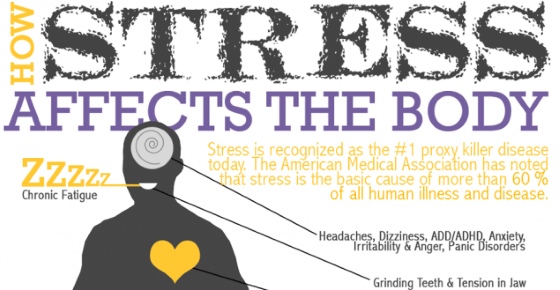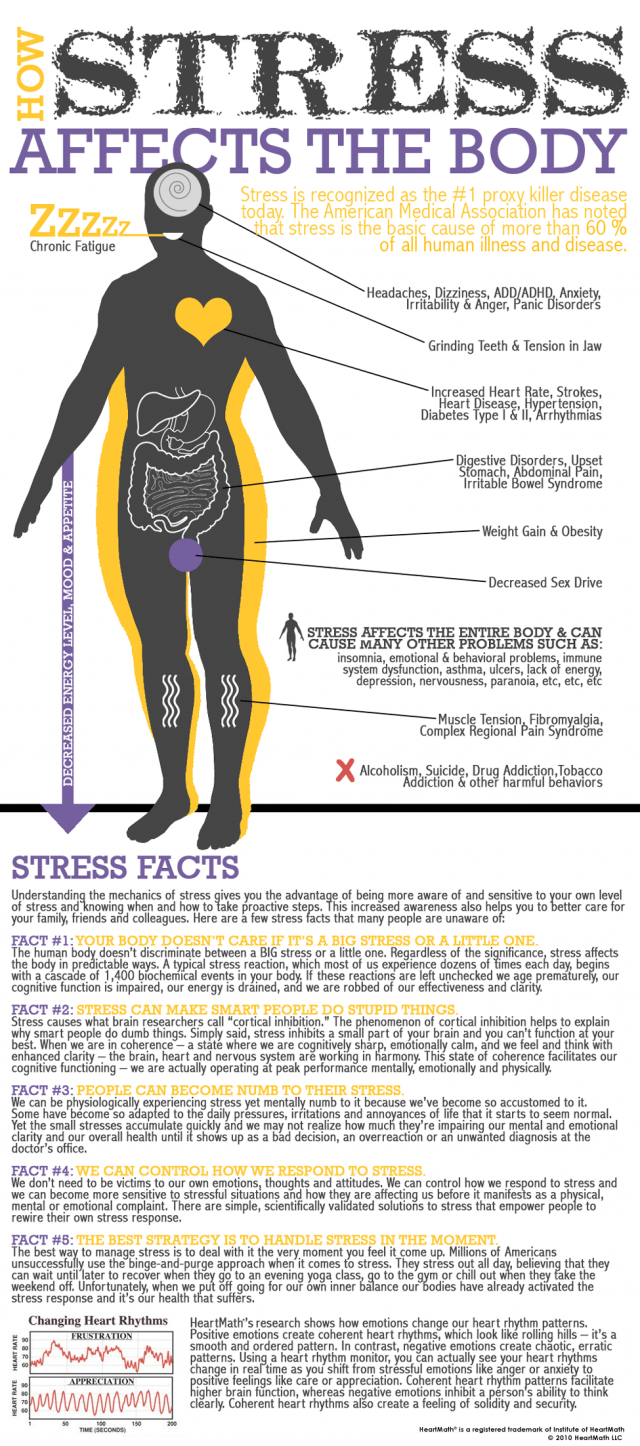How Stress Affects Your Body

Did you know that at least 60% of all diseases can be in some way attributed to stress? Be it physical or emotional, stress causes a chain reaction and creates a colorful chemical mayhem the body needs to deal with. When left unchecked, stress may push you over the edge and into the abyss of uncontrolled reactions and illness. It’s time to understand your stress and be aware of what it can do if you let it take over.
What Happens Inside your Body when you Feel Stressed
It doesn’t matter how big or small the stressful situation is. The body will produce a similar reaction whether you are about to be attacked by a bear or you’re just being questioned by your neighbor about the way you parked your car.
Alarm: Your brain receives a message that you’re being exposed to a potential threat.
Brain trigger: Amygdala, the part of the brain concerned with decision-making and emotional responses, sends a message to the hypothalamus, which is responsible for hormone production.
Hormone release: Adrenalin and cortisol – two stress hormones – get released into the blood. There are 10 warning signs you have high cortisol level.
Body reaction: Cortisol boosts the blood sugar and adrenalin makes the heart beat faster and pump more blood around the body, so muscles are supplied with oxygen and food.
You’re prepared to fight or flight.
Acute Versus Chronic Stress
Our bodies were evolutionary designed to deal with short-term or acute stress. You ran away from the bear, after which your routine returned to normal. Stanford University scientist, Firdaus Dhabhar, was the first to recognize that acute stress can actually enhance your health and improve your immune system function.
The problem starts when your body is in a perpetual state of stress, and the body’s chemistry doesn’t get the time to return to its baseline. People can get so accustomed to being constantly exposed to stressful situations that they mentally adapt to it.
However, that doesn’t mean that their bodies are not taking a toll. When you’re experiencing fear, anger, anxiety and frustration on a daily basis, and this becomes normal to you, you’re quietly accumulating the ill-effects of stress. Many people do that for years until one day their mental or physical health fails them and the facade dramatically falls apart.
Chronic Stress and Health Consequences
Constant stress puts your body under an enormous amount of strain. Almost every organ gets affected.
Brain: If the stressor doesn’t go away (constant deadlines, family worries, physical danger), the brain cannot return to its previous, relaxed state. You can start suffering from insomnia, and headaches or become irritable. Or, you react by over-eating, which can be a result of hormonal imbalances (there are 13 warning signs for hormonal imbalance). Different mental conditions can develop as a result of on-going exposure to stress, including anxiety, depression and substance abuse.
Heart: When the heart rate is increased over a prolonged period of time, the heart muscle becomes tired. High blood pressure is a risk factor for many cardiovascular conditions, including heart attack and stroke. Type 2 diabetes is also associated with a stressful lifestyle.
Digestive tract: The constant rush of hormones upsets your gut and makes it less efficient at absorbing foods, leading to weight-gain. Many digestive disorders are caused or worsened when we feel overly stressed.
Muscles: Flushed with adrenalin, your muscles become tight and you may start adopting unnatural body postures. We often carry stress in a certain part of our musculature, which results in pains and aches of that part. Neck and shoulder pains are very common amongst people who feel stressed. Stress is also one of the most common causes of lip twitching and eye twitching.
Sexuality and reproductive system: Stress interferes with men and women’s sexual hormones. It’s not unusual for the libido to drop or for women to start having an irregular menstrual cycle.
Immune system: Although initially the immune system benefits from a stress reaction, it becomes less rosy as time goes by and the stress continues. The presence of cortisol compromises your immune system and makes you more susceptible to different infections and disease. The recovery time from illness becomes longer as well. A low-grade inflammation starts to exist in the body, possibly leading to many health problems, including cancer.
Depression: A study from 2012 conducted on more that 800 women found that major depressive episodes were significantly associated with both chronic and acute stress. This study highlights the link between chronic stress, along with acute life events, and depression.
A study from 2017 reviewed some of the major effects of stress on humans body systems. For example: Stress can cause structural changes in the brain with long-term effects on the nervous system, decrease in brain mass, and this can affect cognition, memory and learning.
The study also mentions that the effect of stress on the immune system is now an accepted relationship or association, and can lead to malignancy by suppressing the immune system. Stress has also an effect on the function of the cardiovascular system, such as increased heart rate, narrowing of the veins and increased risk of thrombosis and ischemia.
The study adds that stress affects the gastrointestinal health by affecting appetite, normal function of GI tract, stomach acid secretion, and GI inflammation. Also some intestinal diseases such as IBD and IBS were linked to stress. Stress can also change the activity of many endocrine processes.
Stress in Different People
Two people can have different perceptions of the same situation and react accordingly. Giving public speeches can be fun and stimulating for one person, yet extremely frightening for another.
For most people, when we’re under stress, our brains don’t give their best performance. Hence, you can hear and see people say and do all sorts of irrational and stupid things when they suffer from stress. A tiny part of the brain actually gets inhibited, resulting in some unexplainable actions.
The Best Strategy to Handle Stress
The first and very important step is not to ignore the early signs of stress. If you recognize and admit that your body is under an unnatural amount of physical or emotional stress, you’ll be able to tackle it sooner and better.
Don’t postpone your relaxation until the weekend or your next holiday. The best strategy is to deal with stress immediately when it happens and bring your body back into balance.
Techniques for Handling Stress in the Moment
- Recognize your stress signals. Does your neck stiffen? Do your palms start sweating?
- Try talking to yourself in a calm and logical way to inject some more positivity into the situation. Say things like ‘I can handle this’ or ‘I’m going to calm down before I react.’
- Take a few deep breaths. Observe your breathing and don’t let it become shallow and quick. This will help activate your parasympathetic nervous system, which is responsible for a more chilled mode of existence.
- If you can, talk to someone. Talking about things is a great stress relief.
- Stress is contagious. Don’t project stress onto others and don’t take on other people’s stress. There is only as much as one person can handle. When in a conversation, talk in a gentle and calm manner, which will affect both you and the person you’re engaging with.
More Ideas on How to Handle Stress
- You can use these 14 natural remedies for stress and anxiety
- Use these 7 effective meditation techniques to reduce stress.
- There are 18 quick and natural ways to boost your mood.
- You can also try certain essential oils for anxiety.
- Make aromatherapy bath for relaxation.

